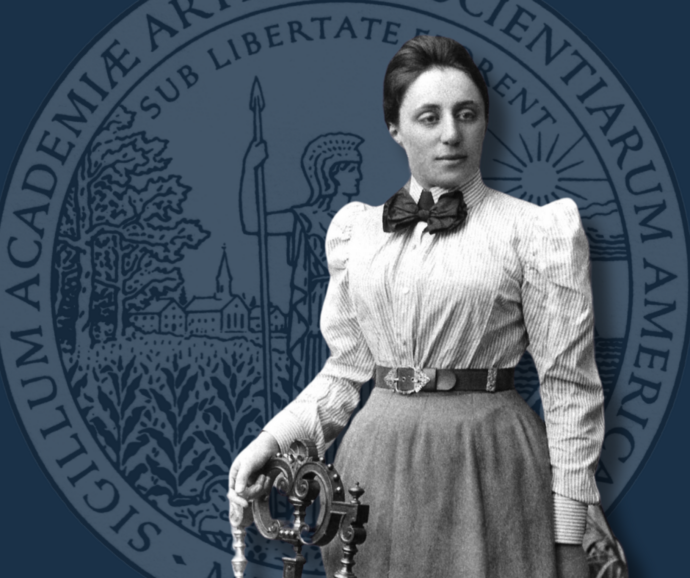
Emmy Noether Selected as Legacy Honoree of American Academy of Arts & Sciences
Amalie "Emmy" Noether, a renowned mathematician and frequent Visitor (1933–35) to the Institute for Advanced Study while working at Bryn Mawr College, has been posthumously recognized as a "Legacy Honoree" by the American Academy of Arts & Sciences (AAA&S). This honor is part of the Academy's efforts to acknowledge individuals "whose accomplishments were overlooked or undervalued due to their race, ethnicity, gender, or sexual orientation."
During her time at Bryn Mawr and her visits to the Institute, Noether was one of the few women mathematicians working in higher education. She made important contributions to topics such as abstract algebra and theoretical physics, sometimes publishing under a man’s name. Her work has had many profound implications for physics, with "Noether’s theorem" providing important insights into black holes, the Higgs boson, and most general theories of physics. Significantly, Noether also proved that every conservation law has an associated symmetry and vice versa, a contribution that, during the twentieth century, became integral to the so-called "standard model" of particle physics.
Helmut Hofer, Hermann Weyl Professor in the School of Mathematics, and a member of AAA&S who nominated Noether, said about her legacy, “Emmy Noether's brilliance was recognized by the leading mathematicians at the time. However, their attempts and support to let her have a university career did not succeed against the prevailing idea in society and universities that women should not have faculty positions. Still, given her resilience, she had 15 students and many of them became very influential in China, France, Russia, and the United States. She was known to be very generous with her ideas and there is no doubt that if her life would not have been cut short, she would have played an even larger role once she settled in the U.S. I am very happy that Emmy Noether, a great mathematician and human being, has been recognized by the AAA&S and is a member of the inaugural group of its legacy recognition program."
Noether arrived in the U.S. in 1933 after fleeing Nazi persecution in Germany, where she had been appointed to an official teaching position at Universität Göttingen. At this time, the Institute served as a haven for many displaced scholars, including founding Faculty member Albert Einstein (1933–55) and Kurt Gödel, who was associated with IAS from his first visit in the academic year 1933–34 until his death in 1978. The Emergency Committee for Aid of Displaced German Scholars, of which Oswald Veblen, Faculty (1932–60) in the School of Mathematics, was a member, helped to raise funds for Noether’s salary.
Noether was recognized by the AAA&S as someone "who advanced abstract algebra at a time when women were not welcome in academia" and whose "conceptual approach to algebra led to a body of principles unifying algebra, geometry, linear algebra, topology, and logic."
The AAA&S, founded in 1780, is both an honorary society that recognizes and celebrates the excellence of its members and an independent research center convening leaders from across disciplines, professions, and perspectives to address significant challenges. Noether is a part of the Legacy Recognition Program’s initial class of Legacy Honorees.


